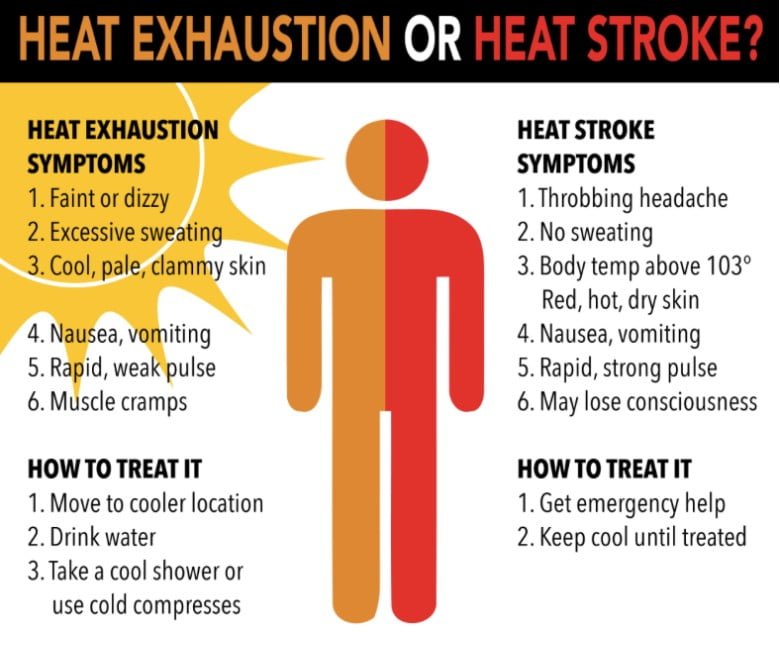31 July 2020
While most of us welcome the warmth of summer, hot weather is not for everyone. In fact, when heat and humidity ramp up, the intense summer sun can bring on sunburn, dehydration, heat exhaustion and heatstroke.
Heat exhaustion if not treated can develop into heatstroke, also called sunstroke. This is a more serious and a life-threatening medical emergency, with the body’s temperature above 103F. Call 911.

Prolonged exposure to heat and insufficient body fluids can result in heat exhaustion. You might be familiar with some of these symptoms. This is what I will focus on today, heat exhaustion and it’s symptoms, as seen in the image above.
Carefully selected homeopathic remedies can be fast and effective at alleviating the symptoms of heat exhaustion. It is a good idea to keep specific remedies at home in your first aid kit, handy when needed, and very effective and quick acting.
Traditional Chinese Medicine focuses on making the correct diagnosis and then selecting the correct chinese herbs to help cool the body and expel the pathogen. Acupuncture can also be of great value here.
During the summer eat more cooling fruits, vegetables and food. Let’s now focus on practical things you can do yourself at home during the hot summer months to keep your body cool, to aid in recovery from too much sun, workouts in the heat, and dehydration.
Foods and beverages to include during the Summer:
- Cucumber, spinach and celery
- Watermelons are 90 percent water and therefore eating it throughout the warmer summer months can help keep your core body temperature low enough that heatstroke is more preventable. Eat the red flesh of the melon, but also the white part of the rind.
- Mint can be used in many summer food recipes. It is frequently added to a pitcher of water to create a nice refreshing drink that can be sipped all day long, or put it atop a fruit salad consisting of strawberries, blueberries, and watermelon.
- Lemon
- Oranges, pears, pineapple, kiwi
- Mung beans
- Green Tea, water and tea, include coconut water at room temperature.
- Rehydrate, because when sweating heavily you lose minerals, which can throw off the balance of intracellular fluid to extracellular fluid.
- Local seasonal fruit and vegetables as they are most suitable for the body during a particular season.
Foods and beverages to avoid during Summer:
- Fried, rich and fatty foods, because they are harder to digest.
- Sugar and alcohol, which contributes to dampness in the body, and should be avoided if experiencing nausea, diarrhea, or when recovering from heat exhaustion.
- Spices such as cinnamon, chili, curry, fennel, garlic, paprika, and pepper. These heat up the body and should also be minimized and used in moderation in hot weather.
- Coffee, because it is considered hot and drying in nature. For those who drink coffee during the summer, a good rule of thumb would be to add in an extra glass of water for every cup of coffee consumed.
- Ice cold drinks should be used in moderation, as it will cause more harm than good. Our bodies are meant to harmonize with summer’s heat.
